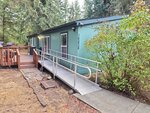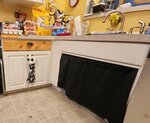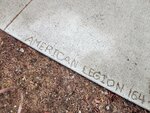





Accidents can happen, terrible accidents. They can literally happen to anyone. It’s a matter of chance -- and risk management. The chances, however, are greater in some places than others, and the “management” in risk management only goes so far when the venue is horrendously dangerous. Everything can, at once, go awry with no notice... and after that, it can get worse.
So it went for Darin Wayne Bertels who was first in the US Army Reserves, then transferred to the US Army. He had several jobs (1988-1996), from administrative office work to medical service to carrying an M-16.
He was about to be discharged circa 1995/96. He was in the 2nd Infantry Division on a night mission – no lights allowed - in what has been described as the “scariest place on earth.” Otherwise known as the Demilitarized Zone (DMZ), it is a bleak 200-mile-wide swath of heavily fortified no-man’s land, a rural countryside with lots of landmines and other dangers, stretching for 155 miles across the peninsula separating North and South Korea. Why was he, a Persian Gulf-era serviceman sent there? Well, it was a time of extreme instability after a North Korean Kim-to-Kim father-to-son regime change and something about the development of an atomic bomb. The US was (quietly) on alert.
The primitive sewers in the DMZ are open ditches. Some of the bad molecular inhabitants include group A Streptococcus bacteria causing necrotizing fasciitis (NF), commonly called the “flesh-eating disease.” The North Korean Army may have weaponized the bacteria in various ways.
Darin scraped his leg in one of the sewage ditches. He was treated, but two to three months later, he was discharged and he had puss oozing out of the wound.
The NF infection spiraled throughout his body over a period of twenty-some years. He lost his left leg from the infection. What was that like? His words, “You’re normal one moment, and the next moment you need help - from everybody - you’re in a chair.”
Later NF attacked his lower right arm. He almost lost it and it had to be reconstructed. Later, NF went to his heart, and, in open-heart surgery, the surgeons used porcine (pig) valves to replace his own. Eventually, the NF caused strokes, nine of them, and now his left side is paralyzed.
Sadly, the Veterans’ Administration issued a denial of some sort and there was a back-and-forth on that. Eventually, a civilian infectious disease specialist helped the VA officials understand that, yes, it is true that over a twenty-year period, the flesh-eating bacterial disease caused aortic problems, strokes, and much more. This highly contagious disease, which necessitates quarantine, attacks internal organs rather than attacking wounds. Darin commented, “I now have a 100% service disability from the VA. This increase from 80% to 100%, provides, among other things, help for my daughter to attend college.”
As to whether he is completely cured of NF, Darin’s emphatic answer was, “Yes, in 2017!” After battling the disease for twenty years, he became, in 2017, one of the first patients in Washington State to receive fecal microbiota transplantation (FMT). FMT is a colonoscopy-like procedure, that recolonizes good bacteria destroyed in disease treatment. It cured him. First described in 4th Century China, this procedure was recently re-discovered. It is increasingly used against all sorts of hard-to-treat infections.
So, with the constraints imposed by the prior disease process, Darin started afresh, with a lust for life. Soon, his teenage daughter, who has been staying with her adult brother in Tumwater to finish high school, will move back in. (South Puget Sound Habitat for Humanity (SPSHH) is about to replace the carpet in her room with laminate flooring.) Darin is very happy to welcome her back home.
“Don’t get me totally wrong, the VA has some EXCELLENT doctors. I appreciate all the VA does. I used to work for the VA and there are good people. I have met some of the best Docs, especially in the areas of medicine and mental health. Some areas are great, but you have to find them. In many areas, they are slow… They have this thing called Adaptive Housing and which is incredibly slow – waiting for them would be just crazy.” And he looks down at the attractive laminate floor just installed by SPSHH.
“I am still dealing with the VA every day,” Darin commented about issues covering a range of categories. He was matter-of-fact about this fact of life. He takes it in stride and does not waste time with negativity.
In response to a question from this writer about how he feels about this country now, he seemed, for a second, caught by surprise.
“It’s been rough, but I have always supported our country – it’s in my blood, my soul. I can’t change it.”
“It’s a good question. No, this happening to me did not change my view. With this kind of thing and the military – things happen! Bad things occur. But it has never changed how I view my country and the people in it.”
“Some people give up and get all bitter and mad at everybody,” he continued. “It’s not worth it! Things happen - drive on and live your life! At least we’re alive.
“Some people get a bad attitude and say, ‘screw our country, blah, blah, blah’”
“But we’ve got wonderful people, in all of our states. I’ve been lucky as I’ve seen almost every state in the nation through the reserves.”
He went on, “I will always support our country. I guess I was inspired by my Uncle Donald and the stories he shared and those of his friends. I got the stories up close and personal. He was a tail gunner in World War II and I kind of joined the military for him. He was dedicated to winning the war – he never quit. His stories affected me. He said to always do the best you can and make a big difference.” Darin later mentioned that he hoped his words in this story will inspire others, those who need help and those who might help others.
Darin's story is a testament to the transformative power of community and compassion. When he faced challenges in his home, South Puget Sound Habitat for Humanity (SPSHH), in collaboration with American Legion #164, stepped in to provide life-changing solutions. From replacing his cumbersome living room carpet with a sleek laminate floor, to installing a functional roll-in shower and wheelchair-accessible kitchen, every modification was meticulously designed to enhance Darin's daily life.
Aiding in this transformation is Zac Marti, an empathetic SPSHH staff member, who listens attentively to homeowners' needs and finds ingenious solutions. As Darin eloquently said, "Whatever makes life easier makes it so much better." Habitat for Humanity's Critical Home Repair program exemplifies this sentiment, making lives better one modification at a time. It's not just about physical changes; it's about restoring dignity, independence, and hope.
Darin's heartfelt appreciation echoes the sentiment of many others who have experienced SPSHH's impact. Every day, SPSHH listens to people's stories and finds solutions, making homes not just accessible but truly welcoming. In the heart of Thurston County, SPSHH's Critical Home Repair Program stands as a beacon of hope and transformation. For individuals like Darin, navigating daily life with physical challenges can be immensely daunting. Darin's story vividly illustrates the profound impact this program has on the lives of Thurston County residents.
Are you or do you know a disabled vet who needs help with their home?
SPSHH participates in a HUD program through Habitat for Humanity International called the Veteran Housing Repair and Modification Program (VHRMP). Through this program and other grants and programs such as Critical Home Repair, veterans in need receive home repairs and needed modifications at no cost to them.
Eligibility: Thurston County residents with a disabled veteran status and less than 80% Area Median Income (AMI).
To apply, click here. For questions email repairs@spshabitat.org or call Amanda Schuyler at 360-763-5691
Critical Home Repair program is for vet and non-vet homeowners, click here for more information.
Shirley Stirling, of Lacey, writes about good things people in Thurston County are doing. If you’d like to nominate someone to be profiled, contact her at shirley@theJOLTnews.com or comment below.
Comments
No comments on this item Please log in to comment by clicking here